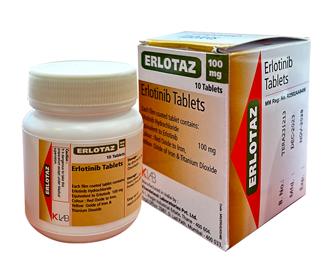
ERLOTAZ 100 mg Tablet
Therapeutic Class
Chemotherapeutic Drugs
Indications
Non-Small Cell Lung Cancer (NSCLC) : Erlotinib monotherapy is indicated for the maintenance treatment of patients with locally advanced or metastatic non-small cell lung cancer whose disease has not progressed after four cycles of platinum-based first-line chemotherapy. Erlotinib monotherapy is indicated for the treatment of patients with locally advanced or metastatic non-small cell lung cancer after failure of at least one prior chemotherapy regimen. In patients with locally advanced or metastatic NSCLC no clinical benefit has been reported with the concurrent administration of Erlotinib with platinum-based chemotherapy [carboplatin and paclitaxel or gemcitabine and cisplatin] and its use is not recommended in that setting. Pancreatic Cancer: Erlotinib in combination with gemcitabine is indicated for the first-line treatment of patients with locally advanced, unresectable or metastatic pancreatic cancer.
Chemical Composition
Each film coated tablet contains Erlotinib Hydrochloride eq. to Erlotinib 100 mg
Packaging
1 x 10's/ Bot
Dosage & Administration
NSCLC: The recommended daily dose of Erlotinib for NSCLC is 150 mg taken on an empty stomach at least one hour before or two hours after the ingestion of food. Treatment should continue until disease progression or unacceptable toxicity occurs. There is no evidence that treatment beyond progression is beneficial. Pancreatic Cancer: The recommended daily dose of Erlotinib for pancreatic cancer is 100 mg taken on an empty stomach at least one hour before or two hours after the ingestion of food, in combination with gemcitabine. Treatment should continue until disease progression or unacceptable toxicity occurs.
Contraindications
Severe hypersnsitivity to Erlotinib or to any of the excipients.
Side Effects
Non-Small Cell Lung Cancer: The most common adverse reactions in patients receiving single-agent Erlotinib 150 mg are rash and diarrhea. Others are; Anorexia, fatigue, dyspnea, cough, nausea, infection, vomiting, stomatitis, pruritus, dry skin, conjunctivitis, kerato conjunctivitis sicca, abdominal pain. Liver function test abnormalities [including elevated alanine aminotransferasa (ALT), aspartate aminotransferase (AST) and bilirubin were observed in patients receiving single-agent Erlotinib 150 mg. These elevations were mainly transient or associated with liver metastases. Erlotinib dosing should be interrupted if changes in liver function are severe. Pancreatic Cancer: The most common adverse reactions in pancreatic cancer patients receiving Erlotinib 100 mg plus gemcitabine were fatigue, rash, nausea, anorexia and Diarrhea. Others adverse reactions include abdominal pain, vomiting, weight decreased, infection edema, pyrexia, constipation, bone pain, dyspnea, stomatitis, myalgia, depression, dyspepsia, cough, dizziness, headache, insomnia, alopecia, anxiety, neuropathy, flatulence, rigors.
Drug Interaction
Erlotinib is metabolized predominantly by CYP3A4 and inhibitors of CYP3A4 would be expected to increase exposure. Co-treatment with the potent CYP3A4 inhibitor ketoconazole has been reported to increase Erlotinib AUC by 2/3. Pretreatment with the CYP3A4 inducer rifampicin for 7 days prior to Erlotinib administration has been reported to increase Erlotinib clearance by 3-fold and reduce AUC by 2/3 to 4/5. Pretreatment and co-administration of Erotinib decreased the AUC of CYP3A4 substrata, midazolam by 24%. The mechanism is not clear. Drugs that alter the pH of the upper GI tract may alter the solubility of Erlotinib and reduce its bio-availability. Increasing the dose of Erlotinib when co-administered with such agents is not likely to compensate for the loss of exposure. Co-administration of Erlotinib with orneprazole, a proton pump inhibitor, has been reported to decrease the Erlotinib AUC. Since proton pump inhibitors affect pH of the upper GI tract for an extended period, separation of doses may not eliminate tne interaction. The concomitant use of proton pump inhibitors with Erlotinib should be avoided if possible. Со-administration of Erlotinib with 300 mg ranitidine, an H2 receptor antagonist, has been reported to decrease Ertotinib AUC. If patients need to be treated with an H2-receptor antagonist such as ranitidine, it should be used in a staggered manner. Erlotinib must be taken once a day. 10 hours after the H2-raceptor antagonist dosing and at least 2 hours before the next dose of H2-receptor antagonist. Although the effect of antacids on Erlotinib phamcokinetics has not been evaluated, the antacid dose and the Erlotinib dose should be separated by several hours, if an antacid is necessary. Cigarette smoking has been reported to reduce Erlotinib AUC. Patients should be advised to stop smoking; however, if they continue to smoke, a cautious increase in the dose of Erlotinib may be considered, while monitoring the patient's safety.

